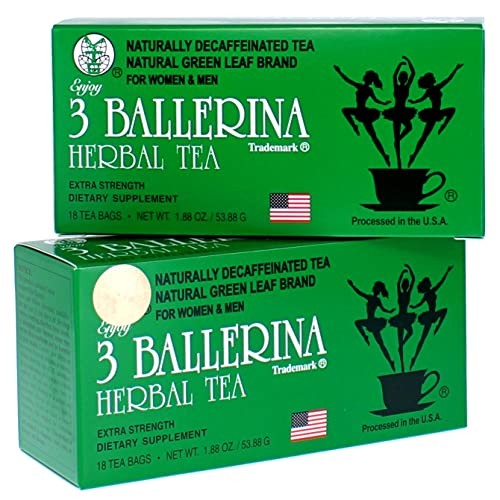
Contents
What Does 3 Ballerina Tea Do to the Body?
Ballerina tea, also known as 3 ballerina tea, is an herbal weight loss tea. Health benefits of ballerina tea include constipation relief and anti-diabetes activity.
Ballerina tea contains herbs traditionally used in some cultures. Marketing claims suggest that ballerina tea aids weight loss, but this may not be true. It may have other uses.
Ballerina tea is an herbal weight loss tea. It’s marketed as a "dieter’s drink", but it’s actually a laxative tea. There isn’t much research on ballerina tea specifically, but the individual herbs it contains have been used for a long time.
Despite marketing claims, laxatives cannot help with weight loss. Laxatives cause water loss, not fat or calorie loss. You may lose water weight, but it will come back when you drink liquids, and you may experience other health effects.
Ingredients in 3 ballerina tea
Ballerina tea usually contains two ingredients: senna and Chinese mallow. These herbs have a long history in traditional medicine, including Ayurveda and traditional Chinese medicine.
Senna
Three ballerina tea contains Cassia angustifolia, commonly called senna or cassia senna. This plant is a fast-growing shrub with bluish-green leaves, yellow flowers, and fruit pods. The leaves are aromatic and release a foul-smelling odor when crushed.
The plant is native to Egypt, Yemen, and Saudi Arabia, and its leaves, flowers, and fruit are commonly used as medicine. Senna has been used to treat parasites, cholera, fevers, anemia, poisoning, and constipation.
Today, the U.S. Food and Drug Administration approves senna leaf and pod products as non-prescription laxatives for home use. Doctors may prescribe senna to empty the bowels before a scan.
Chinese mallow
Ballerina tea also contains Malva verticillata, commonly known as Chinese mallow or cluster mallow. Chinese mallow is an edible, leafy vegetable popular in East Asia, where it’s also used as herbal tea and medicine.
In traditional Chinese medicine, mallow seeds are used to treat kidney stones and osteoporosis, restore kidney function, and maintain milk supply. In India and Ethiopia, Chinese mallow is used to treat various ailments.
Potential health benefits of ballerina tea
There isn’t much research on ballerina tea, but its ingredients have potential benefits.
Constipation relief
Both senna and Chinese mallow have laxative properties, so ballerina tea could help ease constipation.
Sennosides, anthraquinone glycosides in senna, are responsible for its laxative effects. Your gut bacteria feed on these compounds and release byproducts called rhein and rhein-anthrone. These byproducts irritate your bowels and cause them to contract, leading to a bowel movement.
Chinese mallow contains mucilage, which likely causes the laxative effect. Mucilage is a gel-like substance found in plants and often used to soothe the body and help with inflammation. Chinese mallow is also used to treat diarrhea.
Senna is a strong laxative, so herbalists usually mix it with other herbs to offset some of its effects. The mallow in ballerina tea might help neutralize some of the senna side effects, even though it also produces a laxative action.
Anti-diabetes activity
Chinese mallow extracts are rich in oligosaccharides and flavonoids, which have anti-diabetic properties. Studies show they can lower blood sugar, improve insulin function, and increase insulin levels.
In an animal study, a Chinese mallow extract had antioxidant effects and increased insulin release. However, more research is needed to determine the effects on humans.
QUESTION
Side effects of ballerina tea
The herbs in ballerina tea are safe to consume for a short time. Senna products have mild side effects. Long-term use of senna and laxatives can cause health problems and should not be used for weight loss.
Digestive problems
Senna causes digestive side effects, such as nausea, stomach cramps, diarrhea, thirst, and increased saliva. It can also cause rectal bleeding, brown urine, and faintness. Long-term use of senna can lead to dependency, bowel damage, and organ damage.
Long-term use of senna can also cause ongoing stomach cramps and diarrhea. Bowel staining and damage are possible. Laxatives can cause dehydration and serious imbalances affecting your health.
Liver damage
Long-term use of senna can lead to liver damage, although it is considered a rare side effect that resolves after stopping senna use.
Who shouldn’t drink ballerina tea
Avoid ballerina tea if you are pregnant, breastfeeding, have an eating disorder, have a bowel disease, or have undiagnosed stomach pain or digestive problems. Children under 12 should not take senna products without a doctor’s prescription. Adult use of senna should be limited to one week. Consult your doctor for longer use.
Sources: American Botanical Council, BMC Complementary Medicine and Therapies, Cornell University, European Chemistry Bulletin, Food Science and Biotechnology, Journal of Medicinal Plants Research, Journal of Pharmacognosy and Phytochemistry, LiverTox, Molecules, National Eating Disorders Association, Nutrients, Phytotherapy Research, Public Health Nutrition


